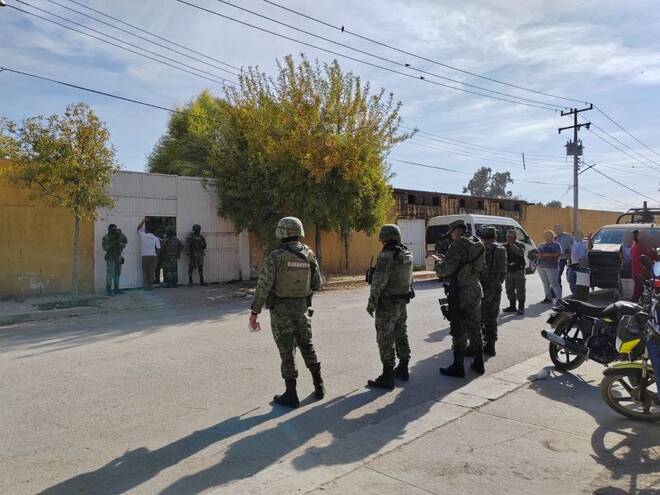Advertisement
Advertisement
Migrants tell of mass kidnappings in Mexico before crossing into the U.S.
By:
By Jose Luis Gonzalez, Jackie Botts and Daina Beth Solomon
By Jose Luis Gonzalez, Jackie Botts and Daina Beth Solomon
CIUDAD JUAREZ, Mexico (Reuters) – Many of the hundreds of migrants who crossed the Rio Grande from Ciudad Juarez into El Paso this week were part of a group kidnapped in Mexico as they made their way to the United States, according to nine migrants interviewed by Reuters.
Testimony from the nine migrants suggests there were multiple kidnappings across several days in the northern state of Durango, with people taken to at least two main locations and held against their will while ransoms were demanded.
The kidnappings are a stark reminder of the dangers faced by migrants as they travel across Mexico, crisscrossing areas rife with drug violence and weak rule of law.
Most of the kidnapped migrants were Nicaraguans, who have been leaving their homeland in growing numbers to claim asylum and pursue better economic opportunities in the United States, encouraged by the knowledge they are unlikely to be immediately deported due to frosty relations between their government and Washington.
The incidents appear to comprise one of the biggest known mass kidnappings in Mexico in recent years, said Stephanie Leutert, an immigration expert at the University of Texas at Austin.
Four migrants said people in police uniforms stopped the buses they were traveling in and attempted to extort them for between 200 pesos ($10) and 5,000 pesos ($255), before entire busloads were taken by armed men to nearby properties where they were held against their will.
Durango’s state security office said it had not received complaints of state police officers involved in the kidnapping and that municipalities were responsible for their own officers. The Durango prosecutor’s office said it had not opened an investigation because it had not received any complaints but confirmed rescues had taken place on Dec. 5 and 7.
In one incident, Mexico’s Migration Institute (INM) said that along with the Army and National Guard it had freed more than 250 people from a property in the Durango town of Ciudad Lerdo on Dec. 5. The National Guard confirmed the details in a separate statement.
In another incident, six migrants Reuters spoke to described being held captive for several days. Two of them specified that they were rescued along with hundreds of other migrants by Mexican federal law enforcement on Dec. 7, and then began walking north on highways.
Fernando Reverte, president of Mapimi, a municipality which the migrants passed through after their capture and release, said the group of kidnapped migrants totaled about 1,500.
Mario Rizo, one of the migrants who said he was kidnapped, said he believed his bus was stopped in the area of the adjacent cities of Gomez Palacio and Lerdo by people in a municipal police patrol truck. Two other migrants also said they had seen people in municipal police uniforms during the kidnapping.
The head of the public safety unit in Gomez Palacio, Ivan Torres, confirmed at least 300 people had been rescued on Dec. 7 from a rural site in the area but that his officers had not been involved in the kidnapping. The Lerdo mayor’s office did not immediately respond to a request for comment.
Reuters could not verify the total number of people who were kidnapped in the region last week. Migrant estimates of the different incidents, combined with the INM figure, suggests it was over 1,000.
Authorities have not announced anyone caught or charged with kidnapping.
‘REACHED THE END’
Kidnappers rationed meager food and water, prioritizing women and children, the migrants told Reuters. They said they spent chilly nights sleeping on floors without blankets in what appeared to be an event hall. Kidnappers yelled at them to stay quiet.
“I sincerely felt I had reached the end … that I wasn’t going to survive,” said Rizo, who is now in El Paso, Texas.
On Dec. 7, according to Rizo, the kidnappers departed quickly after they appeared to spot authorities outside. The migrants broke down the building’s front door, and found members of the National Guard, the Army and the INM outside.
The Army and INM did not respond to requests for comment about the Dec. 7 rescue, while the National Guard said it participated as it did on Dec. 5.
Byron Montiel, a Nicaraguan migrant also now in El Paso, showed Reuters a receipt of a money transfer that he said a relative sent to the kidnappers, and text messages from a kidnapper to one of his relatives demanding money.
By Sunday, the group of migrants had traveled to Mexico’s northern border, where they formed a long queue alongside the border wall, in one of the largest attempted group crossings in recent years.
Leutert said the incident was one example of what migrants went through in the long journey to reach the United States.
“This kidnapping and others show the risks that migrants face in Mexico and all the different groups trying to make money off of them,” she said.
($1 = 19.5774 Mexican pesos)
(Reporting by Jose Luiz Gonzalez in Ciudad Juarez and Jimenez; Jackie Botts in Oaxaca City; and Daina Beth Solomon in Mexico City; Additional reporting by Kylie Madry, Lizbeth Diaz, Ted Hesson and Ismael Lopez; Editing by Stephen Eisenhammer and Rosalba O’Brien)
About the Author
Reuterscontributor
Reuters, the news and media division of Thomson Reuters, is the world’s largest international multimedia news provider reaching more than one billion people every day. Reuters provides trusted business, financial, national, and international news to professionals via Thomson Reuters desktops, the world's media organizations, and directly to consumers at Reuters.com and via Reuters TV. Learn more about Thomson Reuters products:
Did you find this article useful?
Latest news and analysis
Advertisement
